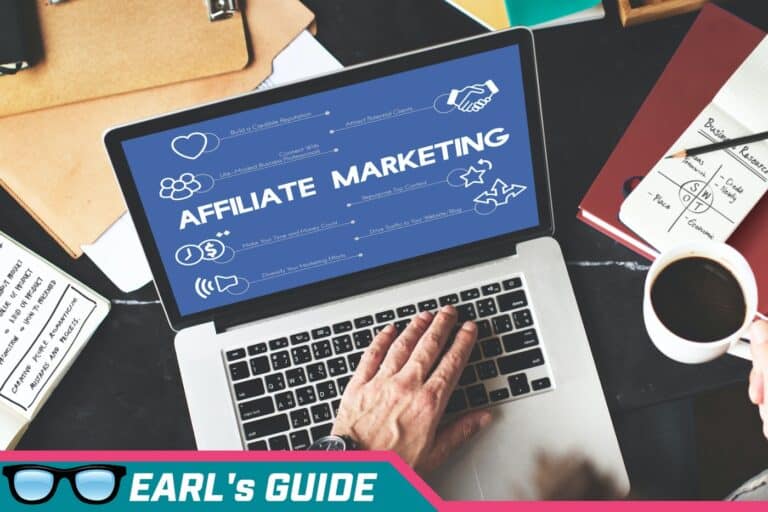What is Affiliate Marketing?
If you’re interested in making money online, you may have heard about affiliate marketing. But what exactly is affiliate marketing, and how does it work? In this blog post, we’ll go over the basics of affiliate marketing and answer some frequently asked questions to help you get started.
First, let’s define affiliate marketing. Simply put, affiliate marketing is a way for a company to sell its products by partnering with affiliates who agree to promote those products and earn a commission for each sale they make. It’s a win-win situation for the company and the affiliate: the company gets more sales, and the affiliate gets paid for their efforts.
How does affiliate marketing work?
You can break down the concept of affiliate marketing into four simple steps:
- The affiliate signs up with an affiliate program.
- The affiliate selects the products they want to promote and receives a unique affiliate link for each product.
- The affiliate promotes the products through their blog, social media, or other marketing channels and includes the unique affiliate link in their promotion.
- When a customer clicks on the affiliate’s link and makes a purchase, the affiliate earns a commission.
Here’s how it works: a company creates a unique link for each product and assigns it to an affiliate. The affiliate then promotes the product on their website or social media channels, using the unique link to track their efforts. When a customer clicks on the affiliate’s link and makes a purchase, the affiliate earns a commission.
There are many different types of affiliates, ranging from individual bloggers and influencers to large companies with their own affiliate programs. Some affiliates focus on promoting a specific type of product, such as beauty or tech products, while others promote a wide range of products from different companies.
In order to be successful at affiliate marketing, it’s essential to choose products that align with your website or social media channels and to promote them in a way that resonates with your audience. It’s also important to be transparent about your affiliation and to promote products you truly believe in. For example, the focus of this site is RV Campground Management.
Now that you have a general understanding of affiliate marketing let’s dive into some frequently asked questions.
How do I become an affiliate?
If you’re interested in becoming an affiliate, the first step is finding a company or product you’d like to promote. Many companies have their affiliate programs, and you can find a list of these programs on affiliate networks such as Commission Junction or ShareASale.
Once you’ve found a company or product you’d like to promote, you’ll need to apply to their affiliate program. This usually involves filling out a form and providing basic information about your website or social media channels.
After you’ve applied, the company will review your application and decide whether to accept you into their program. If accepted, you’ll receive a unique link for each product that you can use to track your sales and earn commissions.
How much can I earn as an affiliate?
The amount you can earn as an affiliate will depend on various factors, including the type of product you’re promoting, the commission rate offered by the company, and the volume of sales you can generate.
Some affiliates earn a few dollars per sale, while others earn hundreds or thousands. It’s essential to remember that becoming an affiliate is not a get-rich-quick scheme – it takes time and effort to build up a successful affiliate marketing business.
How do I promote products as an affiliate?
There are many different ways to promote products as an affiliate, including writing product reviews, creating social media posts, and running ad campaigns.
One of the most effective ways to promote products is through content marketing. This involves creating valuable, informative content that showcases the features and benefits of the product and includes your unique affiliate link. This content can be in the form of blog posts, videos, podcasts, or even infographics.
It’s important to remember that your goal as an affiliate is to provide value to your audience and help them make informed purchasing decisions. Don’t just promote products to earn a commission – focus on creating high-quality content that will help your readers and build trust with them.
Another effective way to promote products is through social media. If you have a large following on platforms like Instagram or Twitter, you can share your affiliate link along with a photo or review of the product. Just be sure to follow the social media platform’s guidelines and disclose your affiliation in your posts.
You can also consider running ad campaigns on platforms like Google AdWords or Facebook Ads. These platforms allow you to target specific keywords or demographics and can be a powerful way to drive traffic to your affiliate link.
How do affiliates choose which products to promote?
There are several factors affiliates should consider when choosing which products to promote:
- Relevance: The affiliate should choose products that are relevant to their audience and the content they create.
- Commission: The affiliate should consider the commission being offered for each product.
- Quality: The affiliate should only promote products they believe in and are of high quality.
- Competition: The affiliate should research the competition for each product and consider whether there is a substantial market for it.
Understanding Affiliate Marketing: A Beginner’s Guide
Affiliate Marketing: Still Relevant and Rewarding in Today’s Market
The evolution of the digital landscape continues at a staggering pace, but one principle remains: consumers often trust and value peer recommendations. Affiliate marketing leverages this core understanding to create incredible opportunities for those who strategically build online audiences. Let’s explore why affiliate marketing isn’t just alive and well–it’s a powerful source of income for niche-focused influencers and content creators.
Demystifying Affiliate Marketing
At its heart, affiliate marketing rewards content creators or websites for promoting a company’s products or services. When a visitor clicks on an affiliate link you’ve shared and completes a purchase, you earn a commission. Here’s how it works:
- Choose a Niche: Identify a specific topic you’re passionate or knowledgeable about (more on this later!).
- Join Affiliate Programs: Companies often have their own affiliate programs or offer them through affiliate networks. Research the reputations of programs and companies.
- Create Content: Generate blog posts, videos, social media, etc., tailored to your audience and subtly highlight relevant products/services.
- Utilize Affiliate Links: Unique links track your referrals.
- Collect Commissions: Receive earnings when clicks translate to qualified sales.
Why Affiliate Marketing Remains a Potent Strategy
- Accessibility: The entry barriers are remarkably low. No need to create your own products or services.
- Low Overhead: There’s minimal startup or ongoing investment required.
- Passive Income Potential: Earn as you sleep, literally!
- Highly Scalable: Income potential grows with effort and audience reach.
Finding Success Through a Niche-First Approach
Choosing a distinct niche is where real power unlocks in affiliate marketing. Let’s say you want to write generally about “lifestyle products”. You’ll face intense competition and your audience will scatter. However, consider the benefits of narrowing down:
- Building Authority: Become the go-to resource for hiking gear for example.
- Genuine Recommendations: Enthusiasm comes through, boosting trust and sales.
- Targeted Audience: Attract like-minded people who already want your suggested solutions.
- Less Competition: Easier to rank high in search, driving better traffic.
Crafting Valuable Content that Converts
Your niche helps, but you won’t see affiliate income flowing by merely plugging in a few links. Here’s how to make your content a powerhouse:
- Solve Specific Problems: Understand your audience’s pain points and how products help.
- In-Depth Reviews: Honest evaluations, highlighting both pros and cons.
- Comparisons: Help visitors decide which product/service truly fits their needs.
- Tutorials and How-Tos: Build genuine trust with practical applications.
Finding the Right Affiliate Partners
Partnering with the right companies is key for substantial, reliable income. Look for:
- High-Quality Products/Services: You must wholeheartedly believe in what you promote.
- Commission Rates: Know how much you can earn per sale—higher is better, obviously.
- Brand Reputation: Protect your own brand by promoting ethical companies.
- Support and Resources: Choose partners that actively help their affiliates succeed.
The Potential for Serious Money: Affiliate Marketing as a Full-Time Income
The phrase “serious money” is subjective, but rest assured, six-figure incomes are attainable, and some earn substantially more. Here’s the catch – serious money demands serious effort:
- Consistent Content: Regular output builds authority (think multiple pieces per week!).
- Audience Growth: Expand your reach through SEO, social media, and networking.
- Testing and Refining: Experiment with different formats and partner promotions.
- Patience: It takes time, this isn’t getting rich quick, it’s building a stable business.
Affiliate marketing holds tremendous possibilities. Treat it strategically, put in the work, and experience its impressive impact firsthand.
How do I track my sales and commissions?
Most companies that offer affiliate programs provide tracking tools to help affiliates track their sales and commissions. These tools usually involve using a unique link for each product, allowing the company to track sales back to the affiliate who made the referral.
Some affiliates use tracking software to help them keep track of their sales and commissions. These tools can provide detailed information about the number of clicks on your affiliate link, the number of sales you’ve made, and the total commission you’ve earned.
Do I need a website to be an affiliate?
While having a website can be helpful for affiliates, it’s sometimes optional. Some affiliates can promote products successfully through social media alone.
That being said, having a website can be a valuable asset for affiliates. It provides a central location for your content and makes it easier for customers to find and purchase the products you’re promoting.
Is affiliate marketing a sustainable way to make money online?
Affiliate marketing can be a sustainable way to make money online, but it’s crucial to approach it with the right mindset. Building up a successful affiliate marketing business takes time and effort, and it’s not something that will happen overnight.
That being said, many affiliates can make a full-time income from their efforts, and some even go on to create successful businesses. If you’re willing to put in the work and have patience, affiliate marketing can be a lucrative way to make money online.
One of the key elements of successful affiliate marketing is building trust with your audience. You can achieve this by promoting products you genuinely believe in and aligning with your values and the content you create. If your audience trusts your recommendations and sees that you promote high-quality products, they are more likely to purchase through your affiliate link.
Another important aspect of affiliate marketing is tracking and measuring your results. Most affiliate programs come with tracking software that allows you to see how well your affiliates perform and which products generate the most sales. This information can help you fine-tune your affiliate strategy and focus on the products and affiliates that are most successful.
It’s also vital for affiliates to diversify their income streams. Promoting various products from different companies and industries can help mitigate the risk of relying on a single product or company for your income. This can be especially important for affiliates who are just starting and may still need to get a large audience.
In addition to promoting products, affiliates can also monetize their blog or social media channels through sponsored content and sponsored partnerships. This involves working with brands to create sponsored content or promoting their products in exchange for a fee. Sponsored content should be clearly disclosed to followers as a paid partnership, as failure to do so can result in lost trust and potential legal consequences.
While affiliate marketing can be a lucrative way to earn income, it is important to remember that building a thriving affiliate business takes time and effort. Consistently creating valuable content and promoting high-quality products will help you build trust with your audience and ultimately drive sales.
Affiliate marketing is a way for companies to sell their products by partnering with affiliates who promote those products and earn a commission for each sale they make. It can be a sustainable way to make money online, but it takes time and effort to build up a successful affiliate marketing business. If you’re interested in becoming an affiliate, be sure to choose products that align with your website or social media channels and promote them in a way that provides value to your audience.

Robert Earl
Robert EarlRobert has 20+ years of experience as a Real Estate Agent, Coach & Digital Marketer. Robert Earl is passionate about teaching and empowering others to pursue their dreams and create sustainable income. Whether through a career in real estate, affiliate marketing, niche blogging, or transforming campgrounds into thriving communities, his proven strategies and techniques have helped numerous individuals and businesses succeed. Based on his years of experience and knowledge in the online marketing industry, along with his hands-on management in the Real Estate & RV Park sector, he has crafted a unique and effective approach to personal and professional growth. In addition to his business pursuits, Robert is also a CrossFit Online Level 1 Trainer (CF-OL1) and enjoys fitness activities, including Rucking workouts while traveling the country. His multifaceted career showcases his dedication to growth, innovation, and the pursuit of excellence in various domains.




